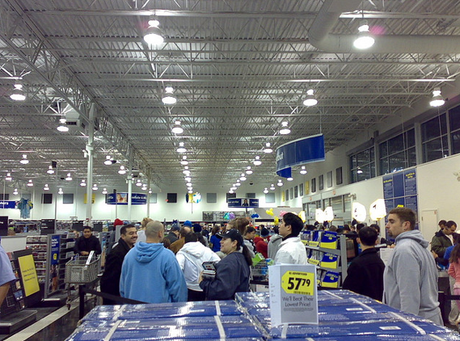I lived with my family in Germany during the academic year 2009-2010, during which time we had to learn to remember to go shopping before Sundays and holidays, when everything closes. While it was irritating to discover stores closed on distinctively German holidays that I hadn’t even known about, we soon adjusted. I found that I really liked having days on which I did no shopping of any kind. Similarly, most stores closed relatively early, by the standards of American suburbia.
When we moved back to the States, it was a bit of a jolt to realize that I might go into a Michael’s or an A.C. Moore to buy craft supplies at 10pm on a Thursday. It suddenly felt awkward and almost wrong to me that this particular store–full of things that no one particularly needs with any particular urgency was full of workers at such an hour. I was embarrassed. I left without buying anything.
Though I’m not there are the moment, I know that the U.S. is in full holiday shopping mania. Some of my nearest and dearest make a good part of their living from retail, and in the main, I have no objection to gifts and decorations and special food and all the rest of it, provided it is not excessive and does not come at a heavy cost to vulnerable people. On the contrary, I love marking the mystery of the Incarnation at this time of year with all sorts of embodied practices: creches and trees; garlands and lights and gifts. I know that those things originated from paganism, and it doesn’t particularly bother me.
Each of these things is–or can be–reappropriated into that old, old story so well. I love it all.
Nor, as longtime readers of this blog (and those who knows me) know, do I have a dog in the “War on Christmas” fight. It’s okay to say ‘happy holidays’ to me.

Black Friday Line by Flickr/TShein.
What I emphatically do not like, though, is the steady erosion of national holidays by unending waves of commerce. I don’t want the stores to be open on Thanksgiving or Easter or Christmas ‘in case I forget something’; I want them all to be closed so that the person whose job it is to run the cash register has the same chance at rest and observance and celebration as I do. I say this cognizant of the fact that many people in the USA do not observe Easter or Christmas, and that others celebrate holidays that go unacknowledged.
Even so, as Marilynne Robinson suggests in her essay “Family” in The Death of Adam,
“If there is any truth in polls, the American public remains overwhelmingly religious, and religion is characteristically expressed in communities of worship. To take part in them requires time. It may be argued that there are higher values, for example the right to buy what one pleases when one please, which involves another’s right to spend Saturday or Sunday standing at a cash register or to compel someone else to stand there. If these are the things we truy prefer, there is no more to be said. But the choice is unpoetical and, in its effects, intolerant. [...] Now people in good circumstances have their Saturdays and Sundays if they want them. So observance is an aspect of privilege, though the privileged among us tend to be the least religious. No wonder the churches are dying out.”
I harbor no illusions that the US will, like Germany, return to the days of stores and businesses being closed on Sundays or on any other single day set apart for family, for rest, for worship, for enjoyment. I do realize that there are always people who must work even on ‘special’ days, and I am grateful for them. But I do want to think long and carefully about what it means that observance has, in America at least (as well as other places) become “an aspect of privilege.” And when people make claims as to the religious sensibilities of the founders, they might do well to consider what ideals are embodied by Americans trampling each other to get a good deal on flat-screen TVs on the very day that they sat around a table ostensibly to ‘give thanks.
{I wrote about the backward encroachment of Black Friday for CT’s her.meneutics blog. Read that here.}
